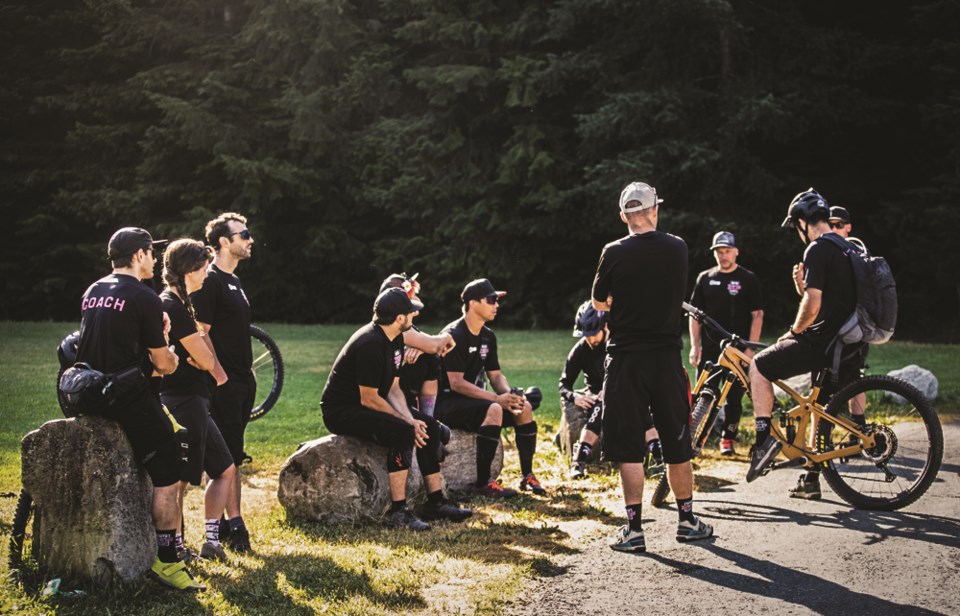What makes mountain biking the accessible, growing and fun sport that we know today? If we were to rank the answers in terms of what’s the most attractive; we’d have to start with the bikes. Contemporary dual suspension mountain bikes are light, equipped with capable and durable parts and are easier to ride than ever before. Their shiny colours and aggressive angles also give you the impression that the more expensive the price tag, the better rider you will instantly be.
The second most attractive contributor to the sport’s access, growth and fun is the trails. Now (mostly) built with sustainability in mind with machines as well as shovels, the trail systems in the Sea to Sky corridor cater to all walks of riders—not just the shredders—and encourage progression through the rider skill levels, rather than having to skip ahead to the gnar and hope for the best.
In third place (again, based on attraction) is coaching. Never quite as alluring as a new bike or a new trail, mountain bike coaching can—and has—contributed to many thousands of riders having a lot more fun on their bikes than they were previously. And just like bike technology and trail building, it has come leaps and bounds in the last 15 to 20 years.
Few have been as deep in the trenches with mountain bike coaching as Whistler lifer Paul Howard. Paralleling his mountain bike teaching career as a snowboard trainer, his mountain bike coaching company ZEP Mountain Bike Camps is celebrating 15 years of operation this summer. It all started with Howard, his bike and a website back when mountain bike coaching had a pretty broad definition.
“In the mid-to-late ‘90s, finding an experienced coach who could offer a quality lesson was like finding gold dust,” said Howard, who researched the industry extensively before starting his own coaching business. “Most of the operations in those days were pretty loose, and I would say borderline kamikaze. A lot of it was simply following an advanced local rider and hoping for the best. You might have done OK, but no one was really teaching anything. Fast forward to today and it’s run as professionally as a ski lesson or a golf lesson.”
Howard was instrumental in forming the Professional Mountain Bike Association (PMBIA) and still works as the organization’s Technical Director, helping train more than 1,200 instructors per year all over the world. This work helped distinguish mountain bike instructors from mountain bike guides, whose focus is more on guiding the terrain rather than developing the client’s skillset. In turn, many mountain bike guides are pursuing PMBIA certification to remain well-rounded and up to date in their profession.
With COVID-19 causing a tidal wave in demand for mountain bikes, has the coaching and instructor world experienced a similar surge? In short, yes, but the onset was delayed due to restrictions on travel and gatherings.
“Last year, I’d never worked so hard to earn so little money,” recalls Howard, who had to adapt his business to serve mostly Sea to Sky locals in 2020. “But as tourism opened up again this summer, at least within Canada, the coaching industry was set up for success. Mountain biking is an outdoor sport that promotes a healthy lifestyle, it’s easy for people to space out, the bikes are easier than ever to ride, the trails are safer to progress and learn on and there are skills programs for every level of rider. That’s all happened organically over the last 20 years and it’s now ripe to see the sport grow even more.”
Global pandemics aside, the biggest ongoing challenge of mountain bike coaching worldwide has been its access and its cultural acceptance. Howard points to his wife’s home country of Australia and his own home country of the United Kingdom, where a culture of “figuring out” mountain biking was the status quo for many years. But those countries are now seeing the benefits that coaching can bring to the overall enjoyment of the sport.
“You might have the best tasting ice cream in the world, but it’s really hard to sell it to people who haven’t tasted it,” said Howard. “The more we can build the community and a global network of coaches, the more mountain bikers will see the value of good quality lessons. Ski teaching has been around for 100 years, that culture is very established. Even after 20 years, we’re still relatively young. But it’s getting there. Mountain biking is experiencing crazy growth in Australia and every time I go back I see more and more coaching operators. It feels like Canada 10 years ago.”
With Whistler being ground zero for so many mountain bike icons—the Whistler Mountain Bike Park, Crankworx and world-class trails, to name a few—it’s no surprise that coaching began its meteoric rise here. The proof? Look at the generation that was raised on coaching in Whistler like Brandon Semenuk and Finn Iles. Few of us can ride that well, but a good lesson will get us one step closer.
Vince Shuley occasionally gets schooled. For questions, comments or suggestions for The Outsider email [email protected] or Instagram @whis_vince.




